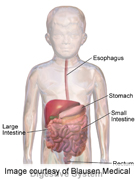
WEDNESDAY, Oct. 31 (HealthDay News) — Certain types of bacteria may cause and maintain Crohn’s disease, according to a new study.
Crohn’s causes inflammation of the digestive system. Symptoms include abdominal pain, diarrhea, weight loss, joint pain, skin problems, fever and bleeding from the rectum.
In this study, researchers found that 19 children newly diagnosed with Crohn’s disease had different levels of a group of bacteria called proteobacteria, which include E. coli and Campylobacter concisus.
The researchers also checked bacteria levels in 21 healthy children.
Patients with mild Crohn’s had higher levels of proteobacteria in their intestinal tracts than those with moderate to severe disease and children without Crohn’s disease. This suggests that these types of bacteria may play a role in causing the disease, said study principal investigator Hazel Mitchell of the University of New South Wales, in Australia.
The findings may help lead to new treatments that target intestinal bacteria.
The study was published in the October issue of the Journal of Clinical Microbiology.
“We deliberately chose to examine children newly diagnosed with Crohn’s disease, as we thought this would increase our chances of detecting species that may be involved in initiating Crohn’s disease,” Mitchell said in a journal news release.
She explained that factors that can affect bacteria in the intestinal tract — such as the use of antibiotics or anti-inflammatory drugs, smoking or alcohol consumption — are less likely to be present in children than in adults.
Although the researchers found an association between these bacteria and Crohn’s disease, they did not prove a cause-and-effect relationship.
More information
The Crohn’s and Colitis Foundation of America has more about Crohn’s disease.

